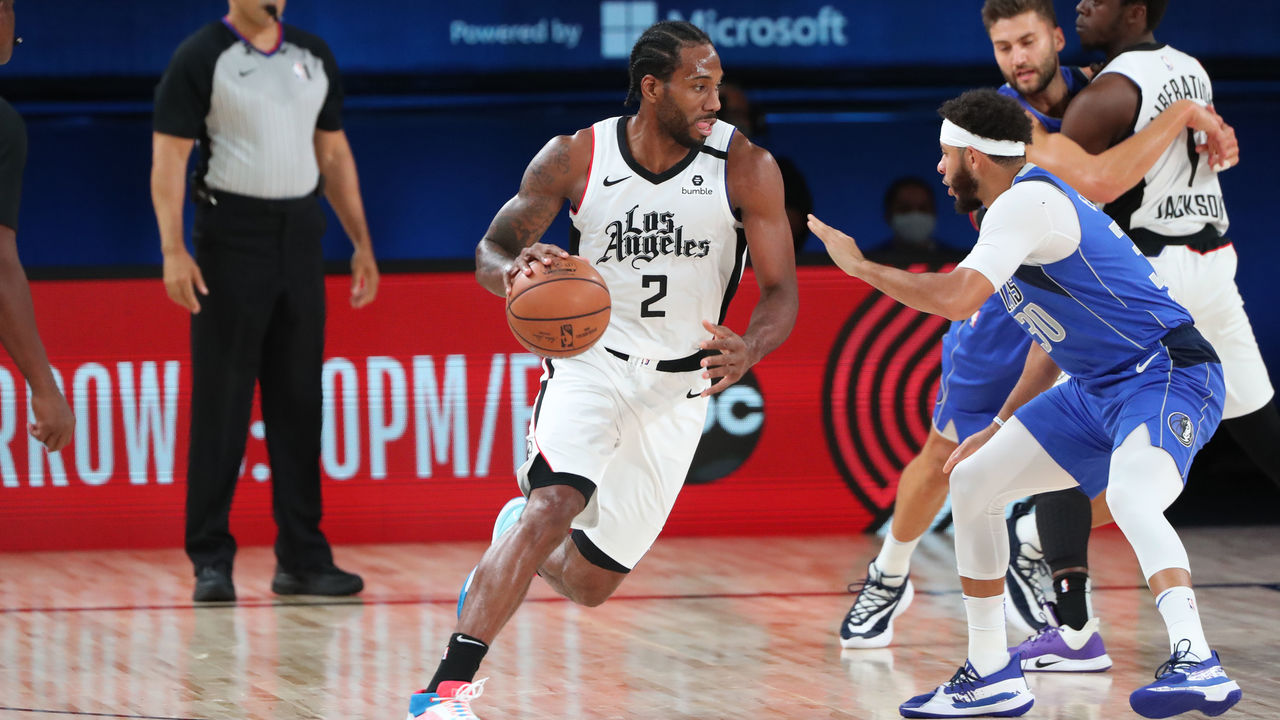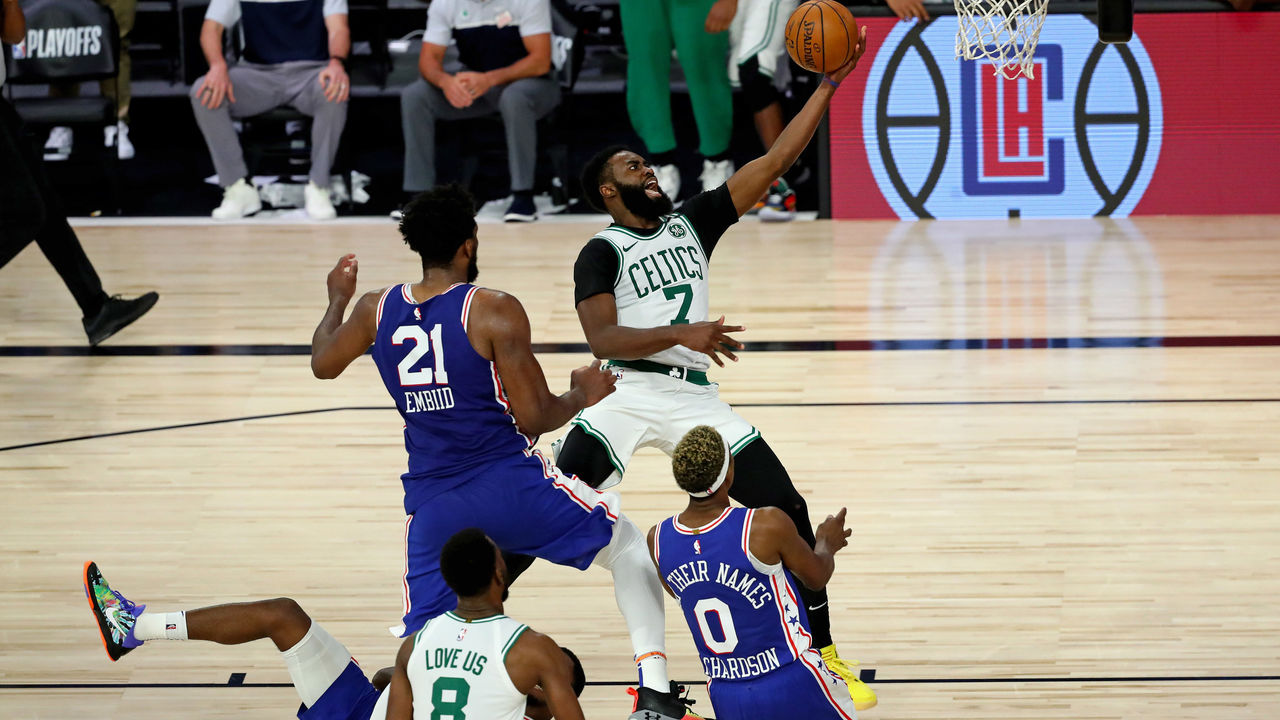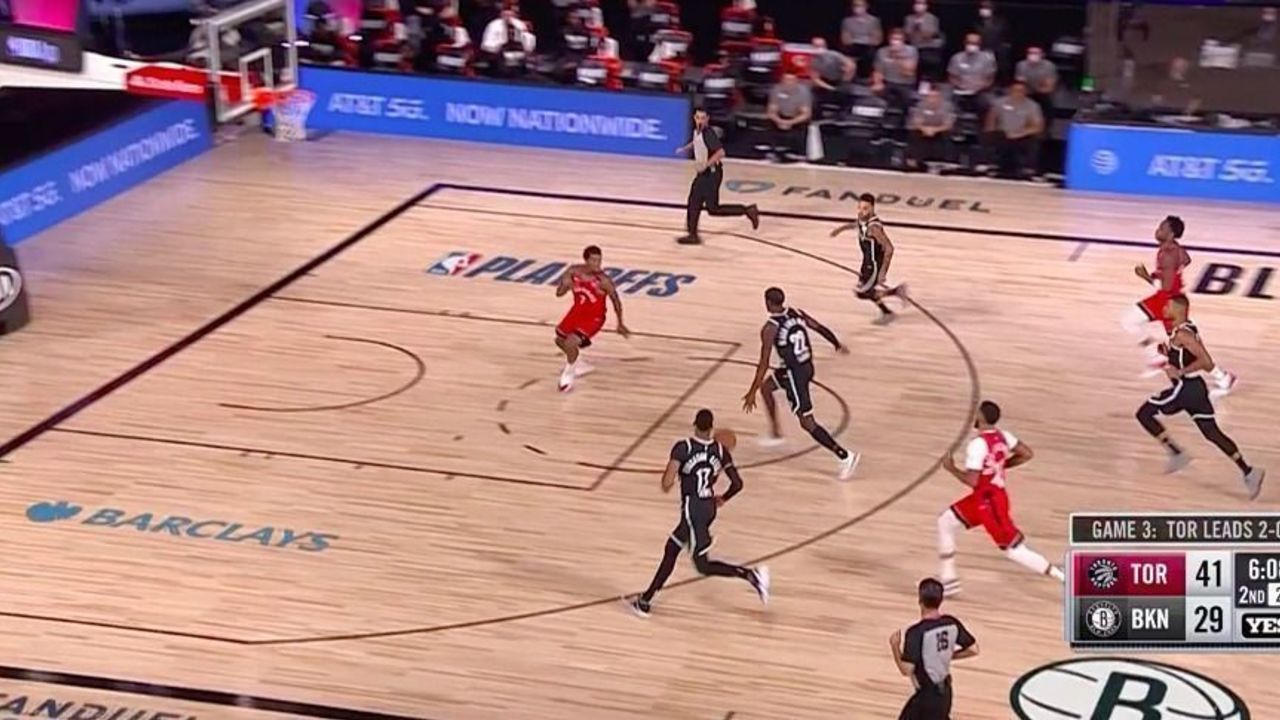Kawhi is inevitable: 4 takeaways from Friday's Game 3 action
The NBA playoffs continued Friday with a four-game slate. Here are some takeaways from Toronto's 117-92 victory over Brooklyn, Utah's 124-87 victory over Denver, Boston's 102-94 win to push Philly to the brink of elimination, and the Clippers' 130-122 victory over Dallas.
Kawhi Leonard is inevitable

The status of Luka Doncic's brutally twisted ankle will dominate headlines until Sunday's Game 4, but the story of Game 3 was Kawhi Leonard's dominance, and the feeling of inevitability that comes with it.
Leonard finished with a game-high 36 points - on 54% shooting - to go with a team-high nine rebounds, a team-high eight assists, a game-high two steals, and a block in 39 minutes of nearly flawless action.
Even those gaudy numbers don't do his performance Friday night justice, as Leonard also recorded a game-high two deflections, and personally contested six Mavericks shot attempts, which matched starting center Ivica Zubac for the team lead.
Though the Clippers maintained control for most of the evening, the pesky Mavs stayed within arm's reach and shot themselves back into the game on multiple occasions. The difference was that any time Dallas crept a little too close for comfort, Leonard would impose his will, whether that meant bullying his way to the rim (for a thunderous dunk or to earn free-throws), patiently getting to his spots and unleashing his automatic midrange game, or wreaking havoc on the defensive end.
Between his freakishly sized hands and his basketball savvy, Leonard also has an uncanny ability to simply go get the ball. Following a missed driving layup on one late-game possession, an off-balance Leonard merely continued to bat and poke the ball around until teammate Marcus Morris could secure the offensive rebound, giving the Clippers an extra 14 seconds to work with.
Through three games, Leonard's averaging 33.3 points, 10.3 rebounds, 5.3 assists, and two steals on 63.1% true shooting, with the Clippers plus-12 in Kawhi's 118 minutes, and minus-9 in 26 minutes without him.
It's all starting to look eerily similar to Leonard's start to the postseason last year, and his play during the 2017 playoffs, when former Grizzlies coach David Fizdale famously quipped that Leonard might bleed antifreeze.
This is where I remind you that a healthy Leonard technically hasn't lost a playoff series in four years (when San Antonio lost to OKC in the 2016 West semis). Leonard's Raptors obviously went four-for-four last spring, the 2018 Spurs didn't have Leonard in the playoffs, and the 2017 Spurs were up 25 on the eventual champion Warriors in Game 1 of the West finals when Leonard landed on Zaza Pachulia's giant, misplaced foot, ending his season.
The Sixers are out of options

It was a more encouraging effort than the team put forth in Wednesday's Game 2, but the 76ers still came up short against the Celtics on Friday. They now need to become the first team in NBA history to rally back from a 3-0 series deficit, or their season's over.
So yeah, their season's over.
Game 3 unfolded a lot closer to the way most of us envisioned this series going, showing why many believed - even without Ben Simmons - the Sixers could keep things competitive.
Joel Embiid was a load down low, and he often paraded to the free-throw line because the Celtics couldn't handle him, finishing with 30 points and 13 rebounds.
The Sixers' lengthy defense, meanwhile, troubled Boston's collection of pull-up, shot-creating talent, and Philly used its size advantage to crash the offensive glass while recording 20 rebounds and 20 second-chance points. Sure, Boston missing a ton of wide-open jumpers helped the Sixers, but as the underdogs, they were always going to need a few bounces.
Yet in the end, the 76ers were left to once again confront the cold, harsh reality that they're just not good enough.
That will probably be the hardest for Embiid to accept. The star big man wasn't nearly as dominant as his production Friday suggests, going 7-for-20 shooting from the field with four turnovers and only one assist in 35 minutes. He was also a game-worst minus-18, and Embiid looked gassed down the stretch when the mistakes started piling up.
The Sixers held a two-point lead and possession with just under two minutes remaining. Then Marcus Smart easily picked off Embiid, leading to a Celtics and-1 on the other end. After that, Embiid settled for a 17-foot fadeaway that Jayson Tatum blocked, which resulted in Josh Richardson committing a clear-path foul. Tatum made one of two free throws, and on the ensuing possession Boston was awarded due to the clear-path foul, Kemba Walker sunk the dagger.
The Sixers have failed Embiid in some ways, including the roster constructed around him. But Friday provided a reminder that he should shoulder some of the blame for Philly's failures, too.
Welcome back, Mike

Unless you're a Nuggets fan still trying to wash out the taste of another embarrassing effort in a Game 3 loss, it's hard not to feel happy for Mike Conley, one of the NBA's all-around good guys.
After toiling away on the Grit and Grind Grizzlies for years without an All-Star selection or NBA Finals appearance, Conley's move to Utah was supposed to be his best chance at legitimate contention in years. The Jazz have failed to live up to expectations, with Conley's disappointing play a big reason the team has sputtered.
But the 32-year-old showed signs of life during the seeding games, and after missing the first two contests of this series to attend his son's birth, Conley put together perhaps his finest performance with the Jazz in Friday's Game 3 against Denver.
He posted 27 points, four assists, and a steal on 9-of-13 shooting - including a ridiculous 7-of-8 from deep - in only 25 minutes of action, during which Utah was a plus-24.
Suddenly, a team that looked ready to be put out of its misery a week ago appears galvanized and rejuvenated. The Jazz now hold a 2-1 advantage in their Western Conference quarterfinal, the Nuggets' defense continues to be an absolute mess, and the Clippers and Mavericks could be heading for a long series before playing the winner of Utah-Denver.
Conley and the Jazz will surely continue to preach taking things one day at a time after a taxing, tumultuous season. But even without the services of Bojan Bogdanovic, Utah can realistically begin to imagine a deep playoff run, with Conley now a driving force following his return.
Kyle Lowry, rim-protector

When we think of rim-protectors, we usually picture physically imposing big men somewhere in the neighborhood of 7-feet tall who rack up blocks while dominating the paint.
Kyle Lowry, who barely checks in at 6-feet tall, forces us to reimagine those traditional conceptions. Toronto's emotional leader and All-Star guard is one of the league's most underrated rim-protectors.
Lowry's penchant for taking charges is well known, and he's arguably the best at that dark art in league history. The veteran led the Association in charges drawn this season and in two of the past three campaigns, and he's drawn a league-leading 63 offensive fouls since the 2016 playoffs. To put that in perspective, no other player has even drawn half of Lowry's total (Steph Curry is second with 31).
But Lowry showcases his defensive intuition and rim protection in other ways, too. Just as a great defensive big man does, his positioning and anticipation when acting as the last line of defense discourages and alters opponents' attempts in the paint.
Even lopsided fast breaks are often an uncertain adventure for Toronto's opponents because of Lowry's presence.
Look at these two images from the second quarter of the Raptors' 117-92 win over the Nets in Game 3 on Friday. One shows a two-on-one fast break, while the second screenshot displays a three-on-one transition opportunity for Brooklyn. Lowry is the lone Raptors defender back in both images.


The first play resulted in a Lowry block, and the second ended with Lowry preventing a shot attempt until more Raptors joined defensively, and Serge Ibaka was able to collect a rebound.
In a blowout victory over a Nets club the Raptors should sweep, this may not seem like much. But in a competitive game or a more evenly matched series that goes the distance, seemingly small possession victories and advantages along the margins add up, and those are the advantages gained when Kyle Lowry plays on your team.
There's a reason he's a perennial plus-minus king. Lowry not making an All-Defensive team yet is a borderline basketball crime.